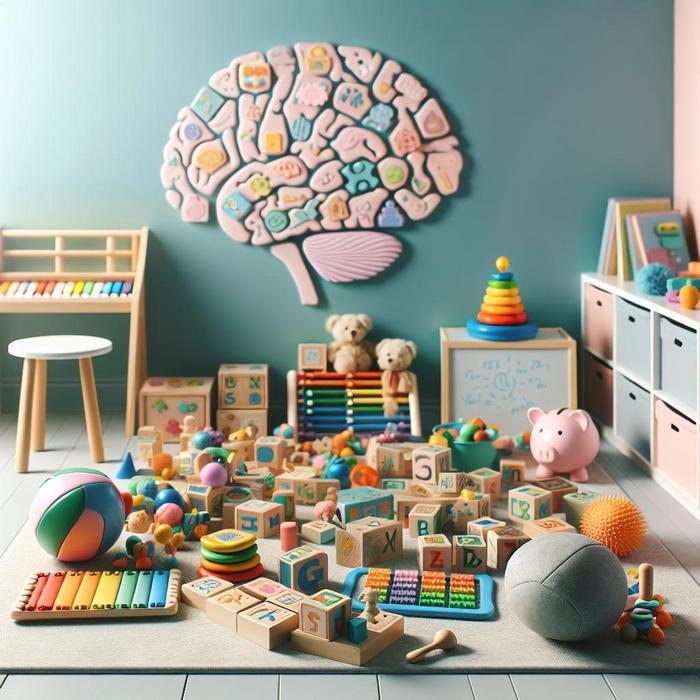The Power of Play: Boosting Baby’s Cognitive Skills
As parents, we all desire the best for our children. We want them to flourish physically, emotionally, and cognitively. The good news? Toys, games, and activities can help achieve this, specifically in the realm of cognitive development. Through play, our little ones can learn about their world, enhance their problem-solving abilities, and stimulate their creativity. This article will explore the importance of cognitive development toys, along with some game suggestions to boost your baby’s brain development.
Why Cognitive Development Toys Matter
Cognitive development refers to how a child learns, acquires knowledge, and interacts with their surroundings. It involves critical aspects like memory, problem-solving, and decision-making. This is why toys and games that foster these skills are so essential. Here’s what they offer:
- Cognitive development toys can stimulate a child’s senses. Sensory play is instrumental in helping babies understand their environment. It engages their senses of touch, sight, hearing, smell, and taste.
- They boost problem-solving abilities. Many educational games and toys design challenges that require children to think critically, driving their cognitive development.
- They foster creativity and imagination. Through play, kids can develop and express their creativity, fostering their cognitive growth.
Top Cognitive Development Toys and Games
Here are some game and toy suggestions that I’ve seen have a positive impact on my child’s cognitive development:
- Shape Board Mirrors: This Edushape 4-Shape Board offers both a sensory and cognitive experience. Babies can touch the different shapes, see their reflection, and learn to recognize shapes, boosting cognitive skills in the process.
- Developmental Toys: Toys like stacking blocks, sorting bins, and puzzle pieces are great for enhancing motor skills, problem-solving abilities, and hand-eye coordination. Check out this list of developmental toys to find the perfect fit for your child’s age and developmental stage.
- Educational Games: Simple games like peek-a-boo, patty-cake, or even singing nursery rhymes can play a huge role in your child’s cognitive development. For more ideas, check out this list of educational games.
Brain-Boosting Tips for Parents
In addition to using cognitive development toys, there are ways parents can actively contribute to their child’s cognitive growth:
- Introduce a variety of food textures: Incorporating different food textures into your child’s diet can stimulate their senses and foster brain development. For safe and creative baby food ideas, check out this article.
- Engage in stimulating activities: Activities that pair movement with learning are fantastic for cognitive development. Visit this site for some stimulating activities to do with your little one.
- Read to your child: Reading to your child from an early age is one of the best ways to stimulate cognitive development. It enhances their language skills, concentration, and imagination.
Remember that every child is unique and develops at their own pace. The key lies in providing a nurturing environment full of love, support, and a variety of stimulating activities.
The Science Behind the Benefits of Play
The power of cognitive development toys is well-documented in numerous research studies. Evidence shows that engaging in play improves memory, focus, and self-control, key elements of cognitive development. According to a research study by the National Center for Biotechnology Information, play enhances multiple dimensions of a child’s development, not just cognitive, but also social, emotional, and physical growth.
Selecting Developmentally-Appropriate Toys
While selecting toys and games, it’s crucial to consider your child’s developmental age. Certain toys are designed to suit specific age groups and development stages. For guidance, UnityPoint Health offers a helpful reference of developmentally-appropriate toys by age. It’s a fantastic resource to ensure that the toys and games you choose suit your child’s cognitive skills, interest, and development stage.
Importance of a Balanced Diet in Brain Development
Cognitive development is not just enhanced by toys and games, but also significantly influenced by a child’s diet. Eating a balanced diet rich in crucial nutrients like DHA and Choline is pivotal for a child’s brain development. Consult your pediatrician for diet suggestions that help boost your child’s cognitive development.
Maximizing the Power of Play
What’s just as important as the play material are the interactions that occur during playtime. Parents and caregivers play a pivotal role in a child’s learning process. Here’s how you can maximize the power of play:
- Active participation: Engage with your child during playtime. Participate in their games, interact with them, and provide feedback.
- Vocalize feelings and emotions: Encourage your child to express their feelings and thoughts during play. This fosters emotional development and enhances their ability to communicate effectively.
- Provide ample playtime: Ensure your child gets plenty of time to play each day. Regular playtime fosters creative thinking, problem-solving skills, and emotional intelligence.
Providing a Stimulating and Safe Environment at Home
Finally, it’s important to provide a safe and stimulating environment for your child at home. Select toys and games that match their developmental stage and interest. Lakeshore Learning offers an excellent range of infant-toddler cognitive development toys. Vary the types of toys, games, and activities your child is exposed to, to keep their interest alive and encourage a broad range of skills. Also, maintain a safe environment for play. Child-proof your home to avoid accidents and injuries during playtime.
In conclusion, every child is unique and their developmental journey is personal. But remember, the key to boosting cognitive development lies in regular, varied, and engaging play. Armed with knowledge on age-appropriate toys, diet, and parental engagement strategies, you are well-equipped to foster your child’s growth and development.

